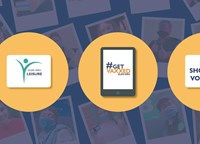27 September 2021
Get Vaxxed Reward and Incentive Program

Council’s Get Vaxxed Reward and Incentive Program will reward those who have already been fully vaccinated (two shots) with the COVID-19 vaccine.
We’re renewing the Service Centre entry at Glen Eira Town Hall. Weekday works from February to May will change how you enter the building. Follow onsite signage or read more here: Town Hall upgrades
Enter text and select option from the drop-down list

Published on 19 November 2021
As there are now more COVID-19 cases in the community, there is a greater chance that we will be exposed to the virus and may develop COVID-19. Even if you are vaccinated, you can still get COVID-19 and will have to isolate at home.
People who are infected with COVID-19 need to stay home to prevent spreading the virus to others. There are some simple things you can do to be prepared in case you, your family or housemates have to go into quarantine at home.
It's best to prepare before someone in your house gets sick. Have a think about the things you use on an everyday basis. If you are in quarantine, you will not be able to go out to the shops so it’s best to have some supplies ready at home.
Most large supermarkets now offer online shopping and delivery services, whilst some smaller independent supermarkets can take your order and payment over the phone and also organise home delivery.
Talk with friends and relatives who don’t live with you about supporting each other if one household has to be quarantined. You can have others drop off groceries or supplies at the front door – just make sure you don't have contact with them and that they don’t come inside your house.
For information on support and emergency relief packages or help getting groceries, Victorians can visit the Government's information hub for more on quarantine and isolation.
Try to have a two-week supply of non-perishable food items in the pantry. Choose some foods that don’t need to be in the refrigerator and can stay on the shelf for a long time. Include items such as:
Consider items you use day-to-day as well as those that will help you reduce the risk of the virus spreading in the household:
Talk to your pharmacist or GP about which medication is right for you and buy enough to last you a few weeks. If you have a repeat prescription think about ordering ahead and ask about home delivery service or click and collect that friends or family can drop off for you.
You may also want to have some medicines in the house to help manage your COVID-19 symptoms such as:
Being in self-isolation or self-quarantine may be stressful, frustrating and boring. Family and friends can also experience similar impacts to their mental health and wellbeing.
There are some things that you can do to look after yourself during this time:
If these feelings become severe or are not going away, please seek help: https://www.coronavirus.vic.gov.au/mental-health-during-coronavirus You can also call Lifeline, 13 11 14 or Beyond Blue, 1300 224 636 for support.
For more information about COVID-19 including testing, isolation, vaccination and financial support visit: https://www.coronavirus.vic.gov.au/
© 2026 Glen Eira City Council